Tag Archives: Hockey
NHL playoff picks: Expect tense games with 1st seed up for grabs
Find line reports, best bets, and subscribe to push notifications in the Betting News section.
We've been spoiled since the NHL's return, so a two-game slate on Saturday feels eerily quiet.
However, you only need one game to have action, so in that regard, we're living in luxury.
Philadelphia Flyers (+120) @ Tampa Bay Lightning (-140)
The round-robin games have been low in intensity at times, but that won't be the case when the Flyers and Lightning meet on Saturday in their final tune-up before the playoffs. Both of these teams are dialed in, making for a tightly contested game with first place and a date with the Montreal Canadiens up for grabs.
The Flyers have allowed just 2.05 expected goals against in two games, limiting their opponents to just eight high-danger scoring chances. The Lightning haven't been as stout defensively, with 3.17 expected goals against in their two games, while giving up 16 high-danger chances. But they haven't missed a beat offensively, and Andrei Vasilevskiy has been excellent.
Philadelphia has benefited from some stout goaltending as well. Carter Hart was superb against the Boston Bruins, while Brian Elliott was sharp against the Washington Capitals. Hart will be back in for this one, with Vasilevskiy remaining in net for Tampa. With both goaltenders on top of their game and plenty at stake, don't expect fireworks in Saturday's lone game in Toronto.
Pick: Under 5.5 (+105)
Vegas Golden Knights (+100) @ Colorado Avalanche (-120)
The first seed in the West is also up for grabs in Edmonton on Saturday. The Knights are having a high-scoring 2-0 start to round-robin play, while the Avalanche have been nearly flawless in their wins.
I'm high on both of these teams, and truthfully there is very little to separate them on the ice. The Knights have a slight edge in goal, while the Avalanche are incrementally better on the blue line, and both are capable of scoring in bunches.
There's a strong possibility these teams will meet in the Western Conference final. If this ends up being the case, possessing top seed - meaning "home-ice" advantage and final line choices before faceoffs - would be huge. There's plenty at stake, so in this final matchup, expect Colorado to keep playing strong defensively and Vegas to try and tighten things up.
Pick: Under 5.5 (+100)
(Odds source: theScore Bet)
Alex Moretto is a sports betting writer for theScore. A journalism graduate from Guelph-Humber University, he has worked in sports media for over a decade. He will bet on anything from the Super Bowl to amateur soccer, is too impatient for futures, and will never trust a kicker. Find him on Twitter @alexjmoretto.
Copyright © 2020 Score Media Ventures Inc. All rights reserved. Certain content reproduced under license.
How the 12th-seeded Habs and Blackhawks clinched colossal upsets
Underdogs prevailed in both of the NHL's 5 vs. 12 qualifying series games Friday. Here are three takeaways from Montreal blanking Pittsburgh 2-0, and Chicago bouncing Edmonton from the playoffs with a 3-2 win.
Montreal's outing went according to plan
There are two ways to frame the Canadiens' mammoth Game 4 shutout victory. One is to say they basically won in five seconds - the elapsed time between Ben Chiarot forcing a turnover in the offensive zone and Artturi Lehkonen cashing Paul Byron's whirled pass to the tip of the crease. The other is all-encompassing - Montreal had a plan on Friday, and it worked to perfection for 60 minutes.
From puck drop, Claude Julien's charges looked entirely content to angle for a 1-0 win. They planned to bottle up Pittsburgh's rushes, prevent the Penguins from gaining any modicum of space or speed, curb the quality of any shots that got through to Carey Price, and seize on the frustration this approach was sure to cause. And, you know, to score eventually.
The Habs' conservative start was striking after they racked up four goals and a whack of scoring chances off the rush in Game 3. Yet it was also logical they'd default to caution, given the skill gap between these rosters. Sidney Crosby and Evgeni Malkin were never at their best, but their reputations precede them. As it turned out, Montreal's four top scorers - Tomas Tatar, Phillip Danault, Max Domi, and Brendan Gallagher - didn't need to supply a single goal in this textbook underdog series win.
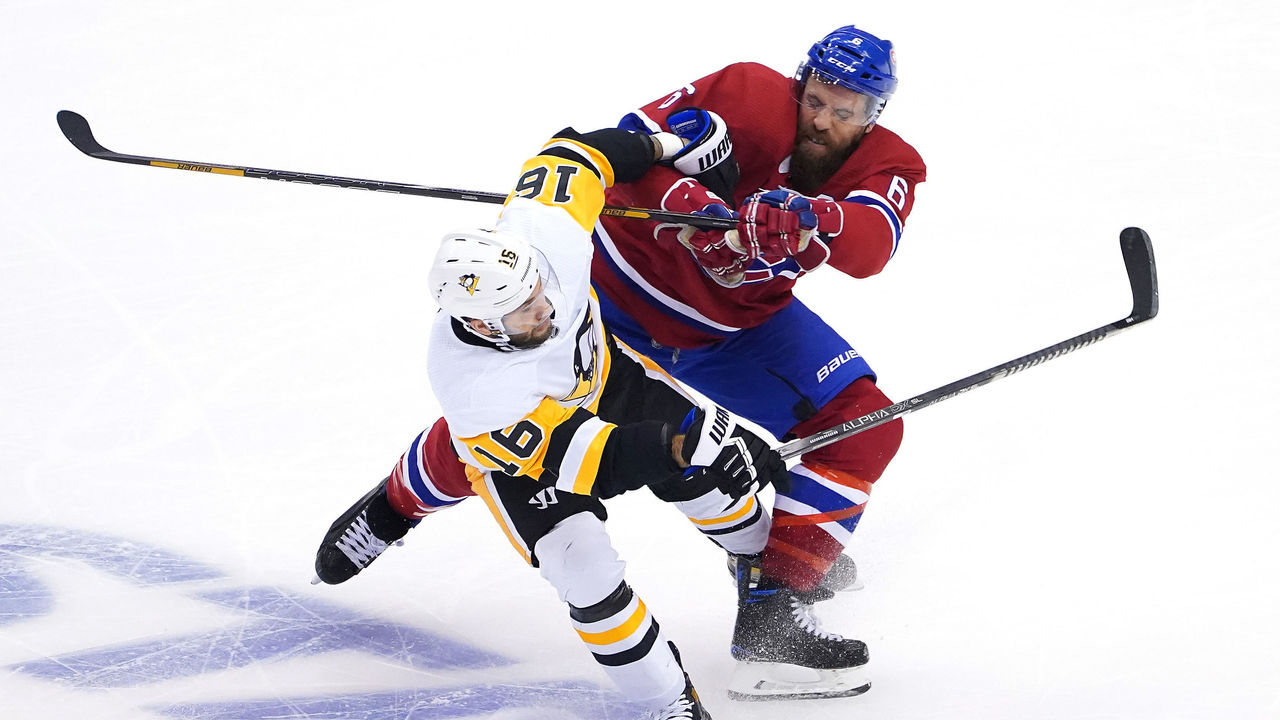
The Canadiens gained more pep as Game 4 wore on, seemingly assured that quickening the tempo wouldn't benefit Pittsburgh. They overran the Pens in shot and scoring attempts from the midway mark on and were sharper down the tense final stretch. Julien rejigged his lines to promote Nick Suzuki to No. 1 center, which galvanized the new second trio of Danault, Byron, and Lehkonen. That line pounded Pittsburgh at five-on-five to the tune of a 70.5 expected-goals percentage, plus the game-deciding goal.
The big picture here: a .500 team, the 24th-best in the NHL, is legitimately in the playoffs, where they'll probably get pantsed in, say, five games by Tampa Bay or Philadelphia. But let's hold that thought for next week. Price's .947 save percentage (.960 at even strength) is the best mark of the qualifying round, and after the Habs lost Game 2 despite his sensational play, other guys - the defensive triad of Chiarot, Shea Weber, and Jeff Petry, primarily - helped lift the club off the mat.
As for that desired 1-0 scoreline? The insurance marker Weber wound up rimming around the boards and into Pittsburgh's empty net came when Chiarot, Danault, Byron, and Lehkonen - plus Price, of course - were also on the ice. For those players specifically, it'd be hard to script a more fitting ending.
Where was Pittsburgh's urgency?
Pardon a quick reference to Friday's Nashville-Arizona game, which the Coyotes won 4-3 in overtime to seal that series. Bowing out at this stage is a profound disappointment for the Predators, the Western Conference's sixth seed, but at least Roman Josi can't be blamed. He didn't score but took a dumbfounding 14 shots on Coyotes goalie Darcy Kuemper, more than a quarter of Nashville's 52 overall.
Suffice to say that Crosby and Malkin didn't rise to Josi's standard in Game 4. The moments that they, or any teammate, played with the needed urgency to snap Pittsburgh's trance were scant. Crosby forced a good save from Price at the end of a rare odd-man rush, and he rang one slapper off iron during a third-period power play. Those were fruitless highlights on an afternoon Pittsburgh generated just 22 shots and three high-danger chances.
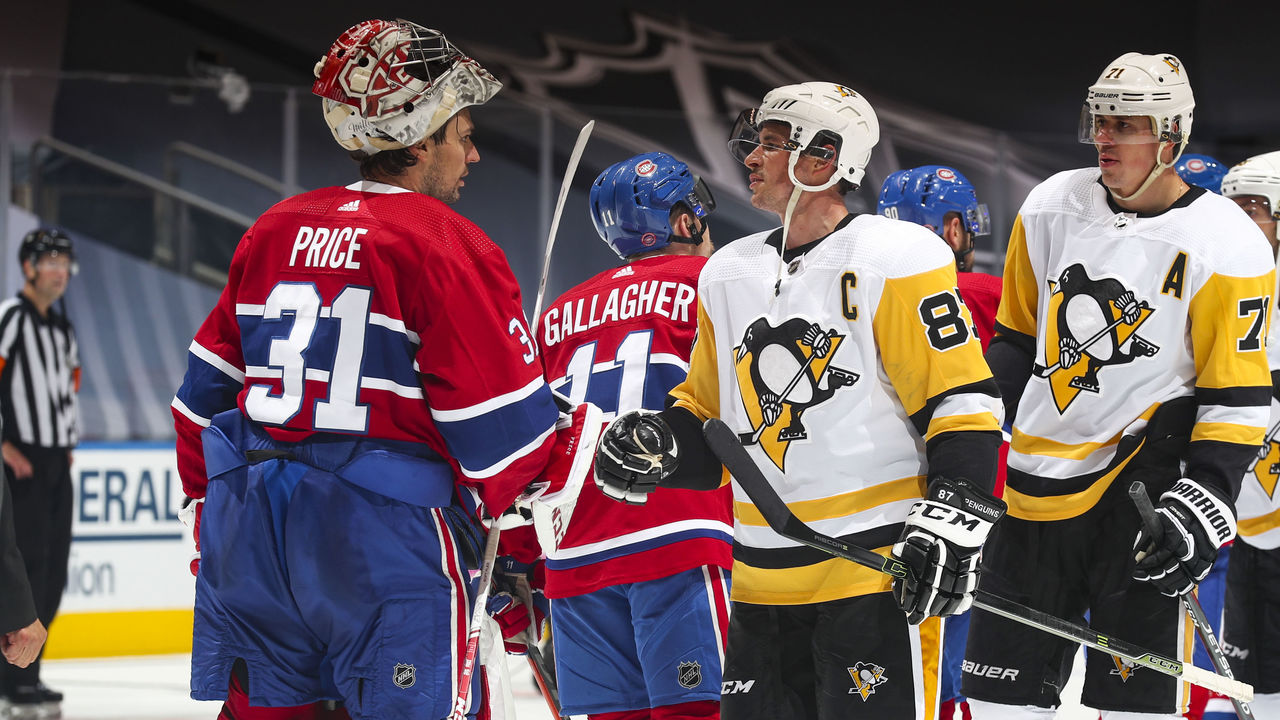
If Montreal was the chief beneficiary of this postseason's unique format, the Penguins fell prey to the danger it represents: a hot goalie toppling a high seed in a shorter series than usual. That doesn't fully explain this catastrophic letdown, though, and for as impenetrable as Price looked at times, stars have to be ready to bear the burden of facing him. Malkin helped drive solid possession numbers across the series but wasn't on the ice for a single Pens goal at five-on-five. Pittsburgh only scored four of them, anyway.
By the time Game 4 ended, broadcasters working the series were trendily pointing out how Pittsburgh's lost nine of its 10 most recent playoff games, including last season's first-round sweep at the hands of the Islanders. Their Stanley Cup form of 2016 and 2017 recedes farther in the rearview every year.
By inserting Tristan Jarry in net for Game 4, coach Mike Sullivan was seeking to replicate the boost Matt Murray provided when he displaced Marc-Andre Fleury during the 2017 Eastern Conference Final. Ultimately, the Pens' struggles against Price negated their goaltending question. Jarry and Murray are both about to hit restricted free agency, but the team's more pressing issue is its great disappearing killer instinct.
Chicago won with mettle
The Oilers could have beaten the Blackhawks without necessarily changing too much, as their No. 5 seed foretold. In what's obviously bare consolation, the advanced metrics are on their side as they exit the bubble in their own home city. Their superior shot share and number of quality chances at five-on-five amounted to an expected goals percentage of 58.52. Put into words, they probably should have won three of four games, not the reverse.
In reality, Chicago outscored Edmonton 12-9 at full strength - and 3-0 across the third periods of Games 3 and 4, as the Oilers squandered one lead and then biffed the chance to claim another and avoid premature elimination. A few factors led to Edmonton's undoing, primarily defensive lapses at the wrong time and the general absence of secondary scoring - an impediment in a matchup that featured so many goals both ways.
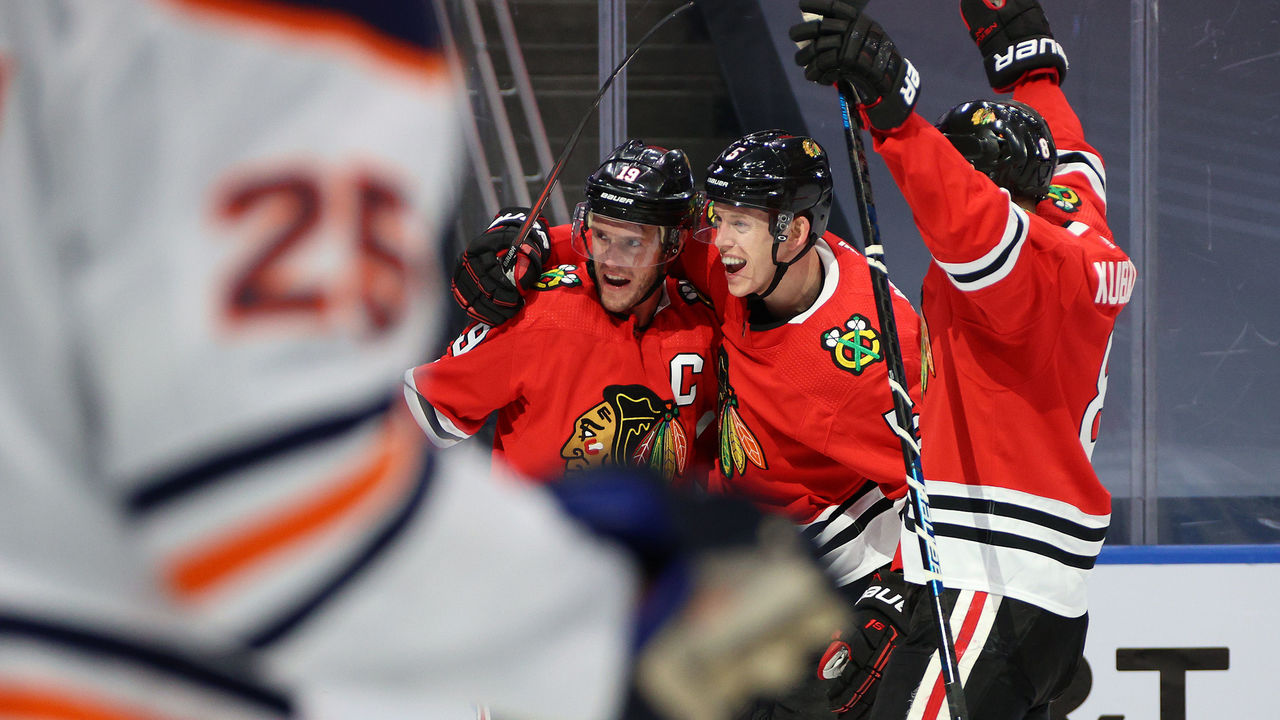
Crucially, the Oilers lacked tenacity in decisive moments, which is what helped the Blackhawks secure their first series victory since 2015, when Jonathan Toews and Patrick Kane last hoisted the Stanley Cup.
In Game 3, Edmonton blinked and lost its one-goal edge in the third period, when Chicago rallied back to score on two netfront tips. The team's cunning and brawn set up all three of their goals in Game 4. Brandon Saad got inside position by the net on Oscar Klefbom ahead of his wraparound tally. At 2-2, Toews outmuscled Ethan Bear in a puck battle and then fed Dominik Kubalik for his one-timed winner.
Small breaks and decisions had an outsize effect in shaping Chicago's victory, which happens in close games. Think of Darnell Nurse's (admittedly dubious) interference penalty that interrupted a five-minute Oilers power play. Think of Kubalik stretching to stay onside during the zone entry that preceded his goal. Think of Edmonton getting booked for too many men with two minutes left, and Chicago adopting a four-corners offense to burn most of that remaining time.
Connor McDavid exits the playoffs as the clubhouse leader in scoring with nine points. Ryan Nugent-Hopkins and Leon Draisaitl were forces in this series, too. But the dearth of help behind them, and strong showings from Kane and Toews in their own right, along with Corey Crawford finally standing tall in Game 4 all offset the duo's brilliance. Crawford's 43 saves included a few huge stops in the waning minutes that will nag Edmonton's stars all summer.
Like Montreal, the Blackhawks will be severely outmatched next round by Colorado or Vegas, the round-robin heavyweights still in the running for the West's top seed. That said, nothing can detract from the gutsiness they showed in the play-ins, nor from the significance of these legendary franchises' latest milestones. Before Friday, no NHL team had shocked the world in a 5 vs. 12 showdown in decades.
Nick Faris is a features writer at theScore.
Copyright © 2020 Score Media Ventures Inc. All rights reserved. Certain content reproduced under license.
What’s up next in the West as Flames oust Jets, Vegas and Avs nab top seeds
Calgary beat Winnipeg 4-0 in NHL play-in action Thursday to eliminate the Jets in four games. Below's a breakdown of where these franchises go from here, plus thoughts on the state of the Western round robin after Vegas' 6-4 win over St. Louis.
Why Calgary's moving on
Five seconds remained in the first period, and Noah Hanifin had the puck on his blade in the neutral-zone circle.
Even endowed with a head of steam, there was little reason for this particular Flames breakout to pose the Jets much trouble. Two defensemen stood between Hanifin and Connor Hellebuyck's crease; three backchecking forwards weren't all that far behind. Congesting Hanifin's passing and driving lanes for a mere tick or two would have exhausted the clock, keeping Winnipeg within a goal at the first intermission of a must-win game.
Turns out a lot can happen in five seconds. Calgary threaded a few passes to get the puck deep, Hanifin - who ended up below the goal line - backhanded a spinning dish toward the crease, and Sam Bennett beat the buzzer with a backbreaking tap-in.
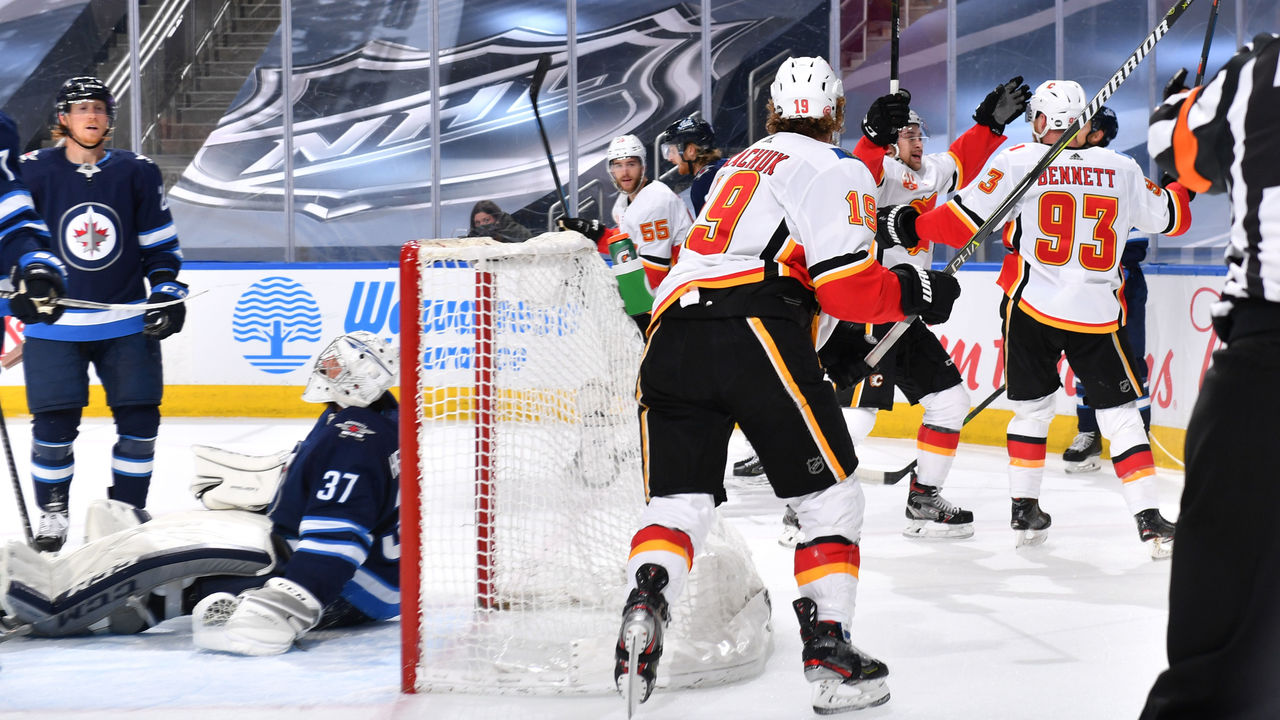
Beyond doubling Calgary's early lead, Bennett's goal embodied a lot of what the Flames did right in this series. Their forwards were first to rebounds or stronger on the puck in the corners. Trailing players drove hard to the net and passers picked apart gaps in Winnipeg's defensive coverage. Crucially, the shooters they found were clinical in converting those opportunities. Eleven players scored for the Flames across four games. The pressure came in waves, and Winnipeg had no semblance of an answer.
Yes, it preceded the postseason's traditional opening round of 16, but Calgary's conquest still constitutes the franchise's first series victory since 2015 - and an impressive bounce back from last year's five-game loss in the first round to the underdog Avalanche. After Game 2, it wasn't especially close. The Flames racked up 16 goals in this series to Winnipeg's six. (The margin was 12-6 if you discount empty netters - still a resounding differential.) The teams' amount of even-strength chances were comparable, but only Calgary executed on the power play, clicking at 29.4%.
Characteristic of a balanced effort, new influencers rose to the fore for the Flames in Game 4. It was Cam Talbot's best night in the bubble, and his 31 saves included several gem denials of Kyle Connor, Nikolaj Ehlers, Adam Lowry, and Jack Roslovic at point-blank range. Up front, there was a reversal of course from Game 3, when five top-six Calgary forwards bagged a goal apiece. Those lines were ineffectual Thursday, but the Bennett-centered third trio buzzed, with him, Dillon Dube, and Milan Lucic controlling 71.43% of shot attempts at five-on-five.
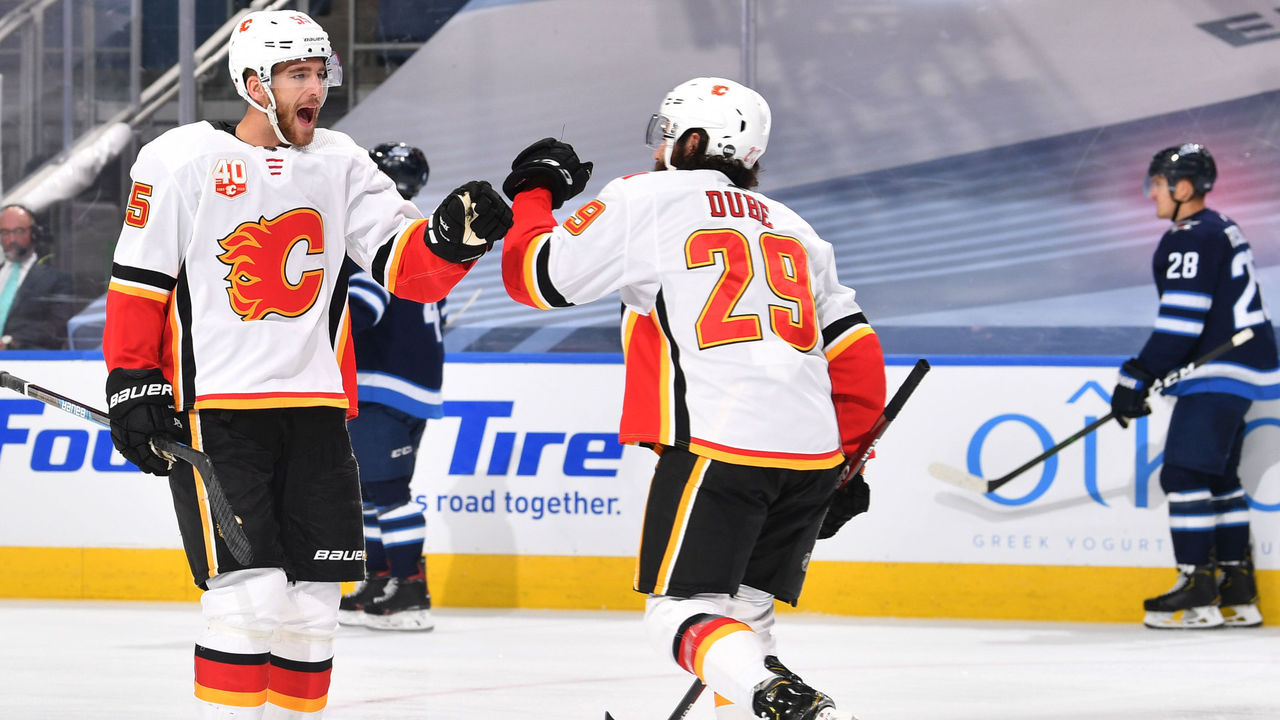
If leads in the Western Conference's other play-in series hold - if Vancouver, Arizona, and Chicago all advance in the next few days - the Flames would be the second-highest seed to emerge from the qualifiers, setting up a rendezvous with the No. 3 team from the round robin: the winner of Sunday's St. Louis-Dallas game. Either Edmonton or Nashville would need to rally back to win their series to make possible a Calgary-Colorado rematch.
Run it back, Winnipeg
An overdue admission about the Jets: it's hard to get an accurate read on a squad that had to forge ahead without its No. 1 center, Mark Scheifele, for all but the first six minutes of the playoffs. That Patrik Laine also missed Games 2 through 4 with a hurt wrist undeniably and irrevocably changed the complexion of the series. Winnipeg was among the NHL's most injured teams this season. Hockey's like that sometimes, and if it's not an excuse for losing, it at least ensured the Jets weren't their truest selves.
As has been the case for a few years now, the Jets' five best forwards - Scheifele, Laine, Connor, Ehlers, and Blake Wheeler - bore the offensive load for an otherwise punchless roster in 2019-20: the 142 goals they united to score were precisely two-thirds of the Jets' 213 for the campaign. Ehlers scored twice this series and easily could have potted three or four more across Games 3 and 4. Less favorably, Connor, Roslovic, and Neal Pionk took a combined 34 shots on Talbot without any finding twine. Down two stars, hard of luck and of finishing ability, this lineup didn't have the juice to hang with Calgary's attack.
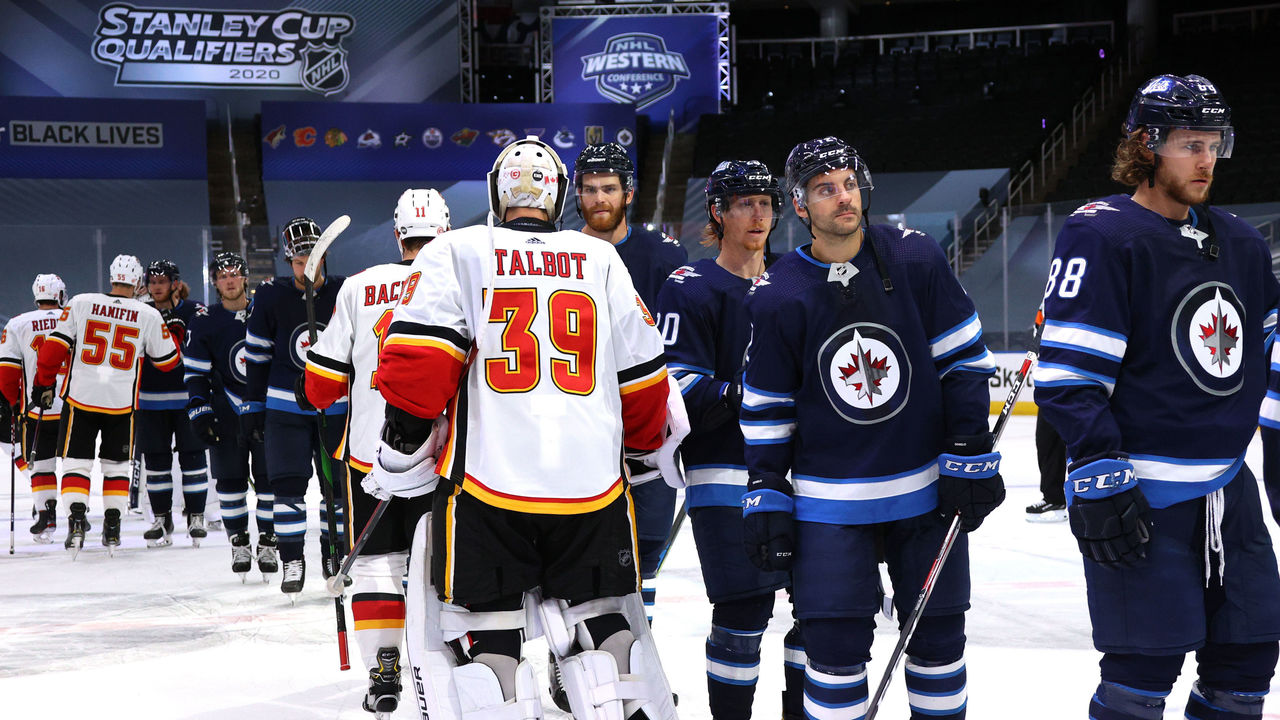
Little should change next season - except, ideally, veteran forward Bryan Little returning healed from the perforated eardrum that sidelined him way back in November. To state the matter harshly, Winnipeg just wasted a Vezina Trophy-caliber season from Hellebuyck, but he, top-pairing defenseman Josh Morrissey, and most of those ace scorers above are signed through 2023-24 or longer for $6 million annually or more. The lone exception is Laine, an RFA next summer.
Basically, this core isn't going anywhere, and absent the impetus to make radical changes for change's sake, health and internal growth will determine the Jets' ceiling. Everywhere but on the blue line, Winnipeg has the star power to front a second run to the Western Conference Final under Paul Maurice. That a split-second brush with Matthew Tkachuk could help delay those ambitions a year is one of this sport's crushing truths.
Of course, losing now might deliver Alexis Lafreniere to Winnipeg. That wouldn't be so bad.
Taking stock of the round robin
St. Louis-Vegas was an endearingly strange game. The Golden Knights outshot the Blues 38-17 and lapped them 71-28 in shot attempts. They were vastly superior for, oh, the last 50 minutes, but committed four egregious gaffes - from brutal defensive-zone turnovers to Marc-Andre Fleury losing his footing on a wraparound - that led directly to as many Blues goals. St. Louis blew a third-period lead and lost in regulation for the second time in the bubble - after never once stumbling to that outcome in the regular season.
Also, the Fox Sports Midwest telecast referred to Vegas as the "Gloden Knights" in one graphic. Everyone has a lot to clean up, basically.
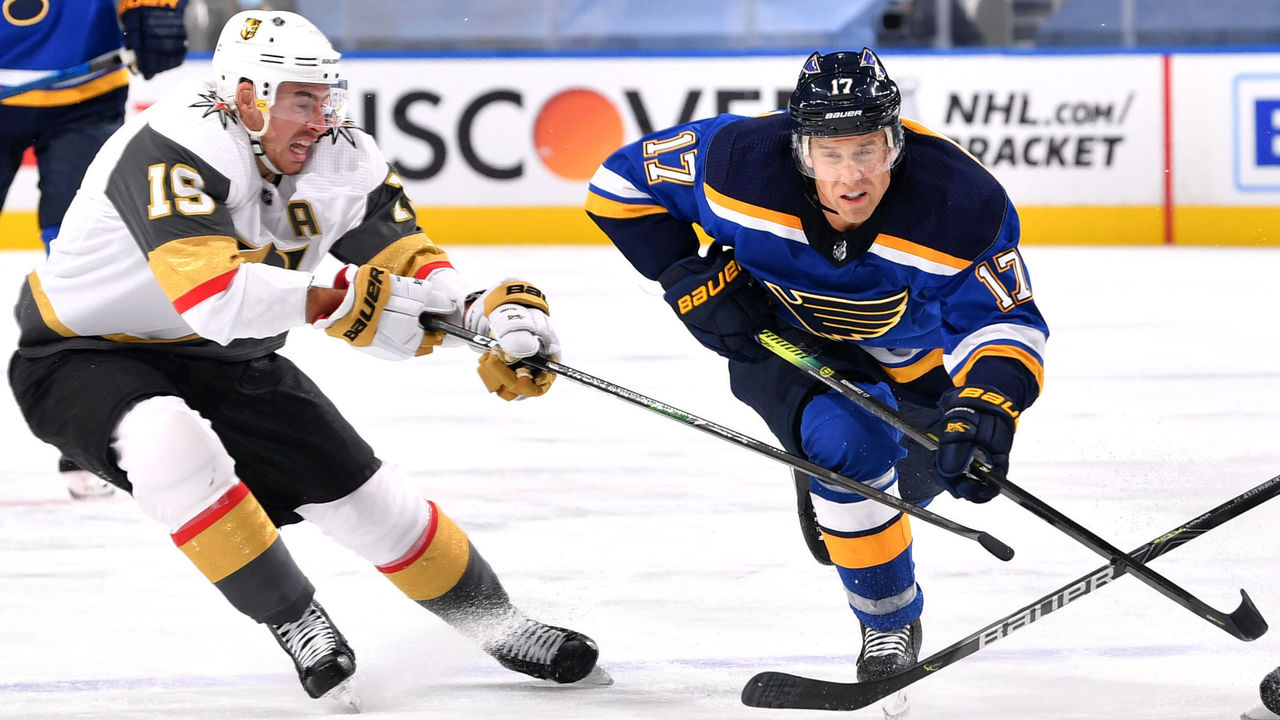
Maybe chaos was to be expected from some round-robin clashes, as top teams take time to rediscover their sea legs without the imminent threat of elimination necessitating urgency. Maybe it's sound to invoke the shrug emoji and move on. These games do mean something, though, and as upsets brew in the Western Conference's 5-12 and 6-11 play-in matchups - with Chicago and Arizona each a win away from advancing - the top couple of seeds in the bracket are starting to look all the more desirable.
In any event, a few early conclusions can be drawn about the teams that'll occupy those seeds. The Golden Knights are generating heaps of chances, as they did all year. Robin Lehner, demonstrably a better goalie than Fleury this season, is coach Peter DeBoer's best bet in net; surely he'll be the choice to start moving forward. We already knew Mark Stone's hands and eyes operate in perfect sync. Justin Faulk (peep the deflection off his skate below) can be assured nothing changed during the layoff.
PLAYOFF 👏 MARK 👏 STONE 👏 pic.twitter.com/2eiWhRJgY2
— y-Vegas Golden Knights (@GoldenKnights) August 7, 2020
Elsewhere, it's clear the Avalanche are in fine form after blitzing Dallas 4-0 on Wednesday. Among other good omens, Colorado amassed 9:31 of offensive-zone possession time to the Stars' 3:55, according to data provided by SPORTLOGIQ. Colorado's six bubble goals have come via six players, including four key offseason or deadline acquisitions in Andre Burakovsky, Joonas Donskoi, Nazem Kadri, and Vladislav Namestnikov. The Avs are deep, no longer wracked by injuries, and face Vegas on Saturday to decide No. 1 positioning.
Nick Faris is a features writer at theScore.
Copyright © 2020 Score Media Ventures Inc. All rights reserved. Certain content reproduced under license.
Matthews’ OT winner completes Leafs’ improbable comeback to force Game 5
When everybody was ready to write off the Toronto Maple Leafs, the players had a different idea on Friday in Game 4 against the Columbus Blue Jackets.
The Maple Leafs were 22 seconds away from an opening-round postseason exit for the fourth straight year when Zach Hyman's equalizer sent the game to overtime.
Hyman's tally was Toronto's third goal in 3:34 after the Leafs trailed 3-0 with under four minutes remaining. Auston Matthews then delivered the overtime dagger, and a winner-take-all Game 5 will now take place on Sunday night.
"I've never been a part of anything like that," said forward Jason Spezza, a veteran of 1,123 regular-season games and 84 postseason contests, according to The Athletic's James Mirtle.
The Leafs' comeback over the Blue Jackets came just one night after they blew a 3-0 lead themselves. Toronto is now the first club in NHL history to overcome a deficit of three-plus goals after surrendering a lead of three-plus goals to lose the previous contest, according to NHL Public Relations.
Copyright © 2020 Score Media Ventures Inc. All rights reserved. Certain content reproduced under license.
Bieksa: Luongo had clause in contract omitting him from road back-to-backs
Roberto Luongo had a unique provision in his contract during his time with the Vancouver Canucks that aimed to provide ample rest - at least a former teammate claims he did.
"Luongo had a clause in his contract where he didn’t have to play back-to-back games on the road if he didn’t want," longtime Canuck and current Sportsnet analyst Kevin Bieksa said on Friday's Hockey Night in Canada broadcast, according to The Athletic's Harman Dayal.
But this is news to Luongo himself:
Wut???? https://t.co/N4Sp9bovOj
— Strombone (@strombone1) August 8, 2020
Goalies rarely play on back-to-back nights on the road as it is, but Luongo apparently wanted no part of it.
The now-retired netminder remained effective into his late-30s, so the guaranteed rest may have played a part.
Luongo signed a 12-year, $64-million contract with the Canucks in 2009. He finished his career with a .919 save percentage and ranks third on the NHL's all-time wins list with 489.
Copyright © 2020 Score Media Ventures Inc. All rights reserved. Certain content reproduced under license.
Hawks’ DeBrincat handed 5-minute major for dangerous hit on Oilers’ Bear
Chicago Blackhawks forward Alex DeBrincat was assessed a five-minute major for boarding Edmonton Oilers defenseman Ethan Bear on Friday night.
Alex DeBrincat gets a five minute major for boarding Ethan Bear. pic.twitter.com/9bMu26g6fC
— Shayna (@hayyyshayyy) August 8, 2020
Bear, one of Edmonton's top blue-liners, was forced to leave the game temporarily, but he eventually returned.
The Oilers' power play, which was the league's best during the regular season, was unable to capitalize on the opportunity.
Copyright © 2020 Score Media Ventures Inc. All rights reserved. Certain content reproduced under license.
Senators, Devils add 2020 1st-round picks with Coyotes, Isles advancing
A pair of trades - including conditional draft picks contingent on postseason outcomes - have officially been sorted, with the Arizona Coyotes and New York Islanders each advancing to the round of 16 on Friday.
The Ottawa Senators now own the Islanders' first-round pick in 2020 as part of the swap that sent forward Jean-Gabriel Pageau to New York at the trade deadline. If the Islanders had instead been eliminated and won the draft lottery, the pick, which was top-three protected, would have been Ottawa's in 2021.
Ottawa now owns three first-round selections at the 2020 draft and an additional four picks in round two.
The New Jersey Devils now own the Arizona Coyotes' first-round pick as a result of the Taylor Hall trade. The conditions on that pick were identical to those in the Pageau deal.
The Devils could add an additional first-rounder in 2020 if the Vancouver Canucks eliminate the Minnesota Wild in their play-in series. New Jersey received the pick when it traded forward Blake Coleman in February to the Tampa Bay Lightning, who owned the Canucks' pick from a previous trade.
Copyright © 2020 Score Media Ventures Inc. All rights reserved. Certain content reproduced under license.
Kraken hire Everett Fitzhugh as NHL’s 1st Black full-time team broadcaster
The Seattle Kraken named Everett Fitzhugh as their team broadcaster Friday. He's now set to become the league's first Black full-time team play-by-play announcer when the Kraken begin play in the 2021-22 season.
"As someone who's worked in hockey for more than a decade, to be named a part of the broadcast and content for a brand-new NHL franchise - particularly one with an organization as strong as the Kraken - is a dream come true," Fitzhugh said. "Getting to the NHL has always been my goal. I look forward to representing the Kraken organization throughout the greater Seattle community."
Fitzhugh spent the last five seasons as the radio play-by-play announcer for the ECHL's Cincinnati Cyclones. He also served as the Cyclones' director of media relations and broadcasting, as well as the team's official spokesperson.
"Everett has established himself as a unique and leading voice for hockey," Kraken CEO Tod Leiweke said. "He's going to bring tremendous energy and talent to our broadcast and content team, and we can't wait for our fans to get to know him."
Copyright © 2020 Score Media Ventures Inc. All rights reserved. Certain content reproduced under license.